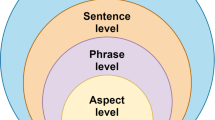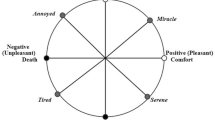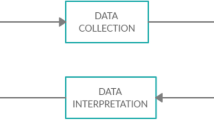Abstract
Recent research and developments in the field of Sentiment Analysis (SA) have made it possible to simplify the detection and classification of sentiments from the textual content. This type of analysis classifies the text according to its positive, negative, or neutral polarity. Recently, researchers have focused on film reviews and aim to extract personal information about text reviews that can, for example, be used to determine the listener’s position on a number of different topics. The main contributions, proposed in the literature, focused on three categories of approaches: (i) a first category based on the lexicon, (ii) a second category based on machine learning, and (iii) a third based on a hybridization of the two previous categories. To our knowledge, and until the elaboration of this study, no previous study has examined the approaches and levels of sentiment in the field of film reviews. In this article, we propose to review and analyze the main works in this field. We begin by giving a methodological review of our study. Then, we present a taxonomy on the domain of sentiment analysis and a generic view of the main families of sentiment classification techniques. As a next step, we describe the different levels of sentiment analysis considered in the literature, then we expose the process of pre-processing, extracting, and selecting the characteristics necessary for the sentiment analysis. We then propose an analysis and a discussion of the results of the main works studied on sentiment analysis. This presentation will then be followed by a discussion of some research questions and a proposal for a number of future directions in this area that we believe are essential to contribute to solving the problem addressed in this article.











Similar content being viewed by others
Data Availability
Not Applicable.
Code Availability
Not Applicable.
References
Banik N, Rahman MHH (2018) Evaluation of naïve bayes and support vector machines on bangla textual movie reviews. In: 2018 international conference on Bangla speech and language processing (ICBSLP), pp 1–6. IEEE
Ahmed E, Sazzad MAU, Islam MT, Azad M, Islam S, Ali MH (2017) Challenges, comparative analysis and a proposed methodology to predict sentiment from movie reviews using machine learning. In: 2017 international conference on big data analytics and computational intelligence (ICBDAC), pp 86–91. IEEE
Atiqur R, Hossen MS (2019) Sentiment analysis on movie review data using machine learning approach. In: 2019 international conference on bangla speech and language processing (ICBSLP), pp 1–4. IEEE, 2019
Adam NL, Rosli NH, Soh SC (2021) Sentiment analysis on movie review using naïve bayes. In: 2021 2nd international conference on artificial intelligence and data sciences (AiDAS), pp 1–6. IEEE, 2021
Chowdhury RR, Hossain MS, Hossain S, Andersson K (2019) Analyzing sentiment of movie reviews in bangla by applying machine learning techniques. In: 2019 international conference on bangla speech and language processing (ICBSLP), pp 1–6. IEEE, 2019
Yasen M, Tedmori S (2019) Movies reviews sentiment analysis and classification. In: 2019 IEEE jordan international joint conference on electrical engineering and information technology (JEEIT), pp 860–865. IEEE, 2019
Rachiraju SC, Revanth M (2020) Feature extraction and classification of movie reviews using advanced machine learning models. In: 2020 4th international conference on intelligent computing and control systems (ICICCS), pp 814–817. IEEE, 2020
Sangam S, Shinde S (2019) Most persistent feature selection method for opinion mining of social media reviews. In: information and communication technology for competitive strategies, pp 213–221. Springer, 2019
Huang T, Zhang D, Bi L (2020) Neural embedding collaborative filtering for recommender systems. Neural Comput Appl 32(22):17043–17057
Moolthaisong K, Songpan W (2020) Emotion analysis and classification of movie reviews using data mining. In: 2020 international conference on data science, artificial intelligence, and business analytics (DATABIA), pp 89–92. IEEE, 2020
Fei N, Zhang Y (2019) Movie genre classification using tf-idf and svm. In: Proceedings of the 2019 7th international conference on information technology: IoT and smart city, pp 131–136, 2019
Darapaneni N, Bellarmine C, Paduri AR, Entoori S, Kumar A, Vybhav SV, Mondal K (2020) Movie success prediction using ml. In: 2020 11th IEEE annual ubiquitous computing, electronics & mobile communication conference (UEMCON), pp 0869–0874. IEEE, 2020
Nagarajan SM, Gandhi UD (2019) Classifying streaming of twitter data based on sentiment analysis using hybridization. Neural Comput Appl 31(5):1425–1433
Kumar V, Subba B (2020) A tfidfvectorizer and svm based sentiment analysis framework for text data corpus. In: 2020 national conference on communications (NCC), pp 1–6. IEEE, 2020
Verma H, Verma G (2020) Prediction model for bollywood movie success: a comparative analysis of performance of supervised machine learning algorithms. Rev Socionetw Strateg 14(1):1–17
Abidi SMR, Yonglin X, Ni J, Wang X, Zhang W (2020) Popularity prediction of movies: from statistical modeling to machine learning techniques. Multimed Tools Appl 79(47):35583–35617
Azizan A, Jamal NNSKA, Abdullah MN, Mohamad M, Khairudin N (2019) Lexicon-based sentiment analysis for movie review tweets. In: 2019 1st international conference on artificial intelligence and data sciences (AiDAS), pp 132–136. IEEE, 2019
Chen X, Xue Y, Zhao H, Xin L, Xiaohui H, Ma Z (2019) A novel feature extraction methodology for sentiment analysis of product reviews. Neural Comput Appl 31(10):6625–6642
Sangam S, Shinde S (2018) A novel feature selection method based on genetic algorithm for opinion mining of social media reviews. In: International conference on information, communication and computing technology, pp 167–175. Springer, 2018
Liu Y, Miyazaki J (2022) Knowledge-aware attentional neural network for review-based movie recommendation with explanations. Neural Comput Appl 35:1–19
Ghosh M, Sanyal G (2018) An ensemble approach to stabilize the features for multi-domain sentiment analysis using supervised machine learning. J Big Data 5(1):1–25
Tripathy A, Anand A, Kadyan V (2022) Sentiment classification of movie reviews using ga and neuroga. Multimed Tools Appl 82:1–21
Yang Y, Ding M (2019) Decision function with probability feature weighting based on bayesian network for multi-label classification. Neural Comput Appl 31(9):4819–4828
Thavareesan S, Mahesan S (2020) Sentiment lexicon expansion using word2vec and fasttext for sentiment prediction in tamil texts. In: 2020 moratuwa engineering research conference (MERCon), pp 272–276. IEEE
Suharshala R, Anoop K, Lajish VL (2018) Cross-domain sentiment analysis on social media interactions using senti-lexicon based hybrid features. In: 2018 3rd international conference on inventive computation technologies (ICICT), pp 772–777. IEEE
Zhang J, Fei H, Li L, Xiaofei X, Yang Z, Chen Y (2019) An adaptive mechanism to achieve learning rate dynamically. Neural Comput Appl 31(10):6685–6698
Dey A, Jenamani M, Thakkar JJ (2018) Senti-n-gram: an n-gram lexicon for sentiment analysis. Expert Syst Appl 103:92–105
Sazzed S, Jayarathna S (2021) Ssentia: a self-supervised sentiment analyzer for classification from unlabeled data. Mach Learn Appl 4:100026
Appel O, Chiclana F, Carter J, Fujita H (2016) A hybrid approach to sentiment analysis. In: 2016 IEEE congress on evolutionary computation (CEC), pp 4950–4957. IEEE
Hung LP, Alfred R (2017) A performance comparison of feature extraction methods for sentiment analysis. In: Asian conference on intelligent information and database systems, pp 379–390. Springer
Sakketou F, Ampazis N (2020) A constrained optimization algorithm for learning glove embeddings with semantic lexicons. Knowl-Based Syst 195:105628
Koumpouri A, Mporas I, Megalooikonomou V (2015) Evaluation of four approaches for” sentiment analysis on movie reviews” the kaggle competition. In: Proceedings of the 16th international conference on engineering applications of neural networks (INNS), pp 1–5
Ayyub K, Iqbal S, Munir EU, Nisar MW, Abbasi M (2020) Exploring diverse features for sentiment quantification using machine learning algorithms. IEEE Access 8:142819–142831
Sethuraman RR, Athisayam JSK (2021) An improved feature selection based on naive bayes with kernel density estimator for opinion mining. Arab J Sci Eng 46(4):4059–4071
Mundra S, Dhingra A, Kapur A, Joshi D (2019) Prediction of a movie’s success using data mining techniques. Inf Commun Technol Intell Syst 1:219–227
Neshan SAS, Akbari R (2020) A combination of machine learning and lexicon based techniques for sentiment analysis. In: 2020 6th international conference on web research (ICWR), pp 8–14. IEEE
Fang X (2021) Making recommendations using transfer learning. Neural Comput Appl 33(15):9663–9676
Yang P, Chen Y (2017) A survey on sentiment analysis by using machine learning methods. In: 2017 IEEE 2nd information technology, networking, electronic and automation control conference (ITNEC), pp 117–121. IEEE
Birjali M, Kasri M, Beni-Hssane A (2021) A comprehensive survey on sentiment analysis: approaches, challenges and trends. Knowl Based Syst 226:107134
Ahmad M, Aftab S, Ali I, Hameed N (2017) Hybrid tools and techniques for sentiment analysis: a review. Int J Multidiscip Sci Eng 8(3):29–33
Sivakumar S, Rajalakshmi R (2019) Comparative evaluation of various feature weighting methods on movie reviews. Comput Intell Data Mining 711:721–730
Chu CH, Wang CA, Chang YC, Wu YW, Hsieh YL, Hsu WL (2016) Sentiment analysis on chinese movie review with distributed keyword vector representation. In: 2016 conference on technologies and applications of artificial intelligence (TAAI), pp 84–89. IEEE
Jagdale J, Emmanuel M (2019) Hybrid corrective critic neural network for sentiment classification in community media. In: 2019 3rd international conference on electronics, communication and aerospace technology (ICECA), pp 1236–1241. IEEE
Feng X, Pan Z, Xia R (2020) E-commerce product review sentiment classification based on a naïve bayes continuous learning framework. Inf Process Manag 57(5):102221
Kumar RS, Saviour Devaraj AF, Rajeswari M, Golden Julie E, Robinson YH, Shanmuganathan V (2021) Exploration of sentiment analysis and legitimate artistry for opinion mining. Multimed Tools Appl 81:1–16
Jaiswal SR, Sharma D (2017) Predicting success of bollywood movies using machine learning techniques. In: Proceedings of the 10th annual ACM India compute conference, pp 121–124
Kadagadkai S, Patil M, Nagathan A, Harish A, Anoop MV (2022) Summarization tool for multimedia data. Global Trans Proc 3(1):2–7
Zhang Y, Zhang L (2022) Movie recommendation algorithm based on sentiment analysis and lda. Procedia Comput Sci 199:871–878
Han H, Zhang J, Yang J, Shen Y, Zhang Y (2018) Generate domain-specific sentiment lexicon for review sentiment analysis. Multimed Tools Appl 77(16):21265–21280
Ismail S, Alsammak A, Elshishtawy T (2016) A generic approach for extracting aspects and opinions of arabic reviews. In: Proceedings of the 10th international conference on informatics and systems, pp 173–179
Bhoir P, Kolte S (2015) Sentiment analysis of movie reviews using lexicon approach. In: 2015 IEEE international conference on computational intelligence and computing research (ICCIC), pp 1–6. IEEE
Patel NV, Chhinkaniwala H (2019) Investigating machine learning techniques for user sentiment analysis. Int J Decis Support Syst Technol (IJDSST) 11(3):1–12
Hung C (2017) Word of mouth quality classification based on contextual sentiment lexicons. Inf Process Manag 53(4):751–763
Chen S, Zhang C, Zeng S, Wang Y, Weihua S (2022) A probabilistic linguistic and dual trust network-based user collaborative filtering model. Artif Intell Rev 56:1–27
Funding
No funding was received for conducting this study.
Author information
Authors and Affiliations
Contributions
MAA, DHA, and MNO contributed to the study’s conception and design. The first draft of the manuscript was written by all the authors. All authors commented on previous versions of the manuscript. All authors read and approved the final manuscript.
Corresponding author
Ethics declarations
Conflict of interest
The authors declare that they have no known competing financial interests or personal relationships that could have appeared to influence the work reported in this paper.
Ethical approval
Not Applicable.
Consent to participate
Not Applicable.
Consent for publication
Not Applicable.
Additional information
Publisher's Note
Springer Nature remains neutral with regard to jurisdictional claims in published maps and institutional affiliations.
Rights and permissions
Springer Nature or its licensor (e.g. a society or other partner) holds exclusive rights to this article under a publishing agreement with the author(s) or other rightsholder(s); author self-archiving of the accepted manuscript version of this article is solely governed by the terms of such publishing agreement and applicable law.
About this article
Cite this article
Jassim, M.A., Abd, D.H. & Omri, M.N. A survey of sentiment analysis from film critics based on machine learning, lexicon and hybridization. Neural Comput & Applic 35, 9437–9461 (2023). https://doi.org/10.1007/s00521-023-08359-6
Received:
Accepted:
Published:
Issue Date:
DOI: https://doi.org/10.1007/s00521-023-08359-6




